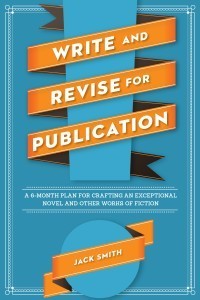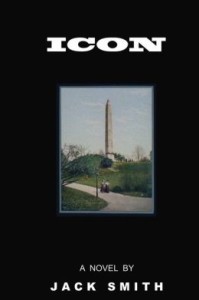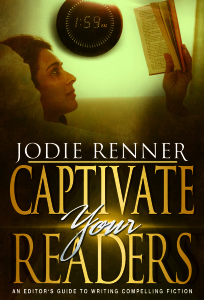Elizabeth Spann Craig's Blog, page 122
March 22, 2015
7 Smart Tactics for Describing a Character in First Person PoV
Would you like to be an actor in your own crazy play, a play you can make up any minute as you go along? That’s basically what telling your story in first person is.
If your narrator is a character in your story, his point of view does come with a couple of limitations though: What your narrator knows, what he sees, what he feels all have to go through the filter of your character’s personality. You can’t switch perspectives and fly from location to location as easily as a neutral narrator, you can’t stay as invisible as a neutral narrator… in short, you lack superpowers!
This post aims to offer a bunch of solutions for one problem in particular: How do you describe somebody when you can’t see him because you are inside of him, looking out, and you don’t even have a reason to describe him? How can you tell your reader what your character looks like through his own eyes?
If your hero suddenly drops a lot of info about her physique without any rhyme or reason, it can easily look like a bad clutter of information, a huge footprint of the author. And because I know flaws like these can easily be overlooked, you can find a free goodie below the post to help you discover problems with your perspective and any other imaginable part of your story (it uses test questions).
Sure, if you are writing your story in first person you could just say: “Hi, I’m Bob, I’m 5’ 7’’, have a greasy ponytail, a porn moustache and mustard stains on my Mickey Mouse t-shirt.” (Wanna meet him, anybody?) That would be very obvious though and also quite boring. Instead, it’s much more rewarding to smuggle information through to your reader carefully interwoven with your story; take her by the hand and gently guide her along into your illusion!
For quick reference, I have compiled the most creative and exciting ways to show what your narrating character looks like:
Good Old Mirrors
That’s the obvious one, and it might be a bit overused. The character could view herself in the bathroom mirror at home or at a restaurant, but there are also many other mirrors in our lives: Think of the rearview mirror of a car, your make-up kit or even a house of mirrors at an amusement park.
Any Reflecting Surface
Likewise, any reflective surface can be used for mirroring fun: Take the window of a train compartment, a shop window, any smooth water surface (whether it’s a lake, a swimming pool or your mom’s bathtub), metal surfaces like pots, sugar boxes of silver, door handles of brass, or any smooth industrially made metal plate like a metal table in a restaurant kitchen or a morgue slab (a pretty combination, right…?).
Some of these surfaces do reflect better than others – so make sure you only go as detailed in your descriptions as is realistic.
Any Portrayal of Your Character
Now we become less industrial and more human. Think of any photo your character could have hanging on his wall or standing on his nightstand, portraying himself. Why not let him flip through a family album?
The most likely photos would be from his childhood days or with friends or family; likewise on special days, for example in full-on wedding gear or at his graduation ceremony in robe and cap; a proud mugshot, whatever… Family photos on office desks are very popular with screenwriters looking to show off their characters’ family ties.
But your portrayals don’t have to come by lens, they could also come by brush. Yes, some people let themselves paint and hang it on their living room wall. Others receive paintings as gifts from relatives or from their poker club. And some will find their paintings even in galleries or over their cousin’s toilet; in fiction, the possibilities are endless, just play with your ideas and spice them up!
How about a scene in which a sidewalk artist paints a portrait of your protagonist, leaving ample room for conversation about his best physical traits and shortcomings?
Also, it doesn’t have to be precisely a painting, maybe it’s a piece of embroidery or a plaster-cast of his face or… you get the idea.
People Tell Him What He Looks Like
Lean back; you, the author, got nothing to do with it: Just let your characters describe him! The range goes from simple comments that he looks pretty or ugly to detailed remarks about his appearance.
Make sure to always give the speaker a really good reason for his remarks. For example, imagine a scene on the beach and somebody telling your narrator: “Get some sunblock, dude! Guys with your complexion look like crabs after five minutes.” What do we know about the character’s appearance now?
Imagine somebody telling a blonde joke and immediately apologizing to your narrator (just for the heck of it?). What do we know about her?
Putting Together the Details
You can sprinkle clues of what your character looks like throughout your story like raisins in a plum cake and let the reader combine all of the details.
For example, Martin needs to fold up like an accordion on airplane and theatre seats, which suggests that he is tall. Charlie strokes over his bald head frequently, which means he doesn’t need a hairdresser anymore.
Abstract Solutions
Now we get to the far out solutions. Not as far out as a giant bunny rabbit named James suddenly appearing to reveal to your character that she is beautiful – but still, if not done carefully, these tricks can leave a stale aftertaste in your audience’s mouth.
Here are the candidates:
Number one is the old author’s favorite for tying up impossible endings: It was just a dream! So your figure might for example see himself floating from above while sleeping. Now he has an opportunity to describe what he looks like.
Number two is a near death experience and would definitely involve floating from above, if you can believe the cliché. People who were clinically dead for some time have described this experience as “hovering in a white tunnel.” It has the side effect of letting your character take a good, hard look at himself.
Number three is indeed the introduction of an abstract figure, and it doesn’t have to be the giant rabbit. Take the grim reaper, angels or the devil, showing your character her body from outside. The experience could be induced by drugs, trauma or extreme sleep deprivation. As you can imagine, this is no everyday solution for your story…
Inner Monologue
Finally, let’s also mention that if nothing else works, you can always fall back on inner monologue. Again, make sure there is plenty of motivation for your narrator to judge or describe himself: Insecurity, vanity, or whatever else it may be – and I’m sure you can find some positive reasons as well… as soon as she is talking about her feelings, you can easily bridge the gap to her appearance.
So there you have it, a lot of options to choose from for this little problem. Now over to you: What’s your favorite way of letting your readers know what your characters look like, even if you don’t tell the story through their eyes? How do you tackle this challenge? Let us know in the comments!
 About the author:
Alex Limberg is the author of Ride the Pen, a creative writing blog dissecting famous writers (works, not bodies); his blog includes detailed writing prompts. Train your idea muscles with a 6-part writing exercise in his free e-book (download here) about ‘44 Key Questions’ to test your story. Shakespeare is jealous. Alex has worked as a copywriter in a Hamburg advertising agency and with camera and lighting in the movie business.
About the author:
Alex Limberg is the author of Ride the Pen, a creative writing blog dissecting famous writers (works, not bodies); his blog includes detailed writing prompts. Train your idea muscles with a 6-part writing exercise in his free e-book (download here) about ‘44 Key Questions’ to test your story. Shakespeare is jealous. Alex has worked as a copywriter in a Hamburg advertising agency and with camera and lighting in the movie business.
Image: MorgueFile: The Brass Glass
The post 7 Smart Tactics for Describing a Character in First Person PoV appeared first on Elizabeth Spann Craig.
March 21, 2015
Twitterific Writing Links
by Elizabeth S. Craig, @elizabethscraig

Twitterific writing links are fed into the Writer’s Knowledge Base search engine (developed by writer and software engineer Mike Fleming) which has over 30,000 free articles on writing related topics. It’s the search engine for writers.
Why So Many People Write at Starbucks: http://ow.ly/Kl2NW @theryanlanz
3 Career Reinvention Tips From A Reporter Turned Romance Writer: http://ow.ly/KkYhI by Cindy Fazzi @forbes
5 Ingredients for Great Characters That You’re Not Using (Yet): http://ow.ly/KkY7J @screencrafting
Music For Writers: A Quartet Named @ethelcentral & Guitarist @KakiKing http://ow.ly/KyzaY @Porter_Anderson @EcstaticMusic @Q2music
Editing Clauses in Publishing Contracts: How to Protect Yourself: http://ow.ly/KlUWl @victoriastrauss
How Mirror Characters Can Illustrate Literary Themes: http://ow.ly/KlVGC @SaraL_Writer
The art of the political memoir: http://ow.ly/KlWzM @bbcscotlandnews @BBCAndrewBlack
The 4-Step Process To Promoting Your Books: http://ow.ly/KlUFY @amcbooks
A Twitter Book Marketing Strategy: http://ow.ly/KlV7z @booklaunchdemon @Creativindie
How to Self-Publish Children’s Books Successfully: Notes From the Trenches: http://ow.ly/KlVVD @fictionnotes @Janefriedman
5 Ways to Turn the Tables on Creative Indecision: http://ow.ly/KlV4Y @CreativeKatrina
How Not to Develop Characters 101: http://ow.ly/KlVDd @beccaquibbles
In Defense of Self-Publishing: http://ow.ly/KlUzB @marcygoldman @passivevoiceblg
Writing Commercial Fiction and Loving It: http://ow.ly/KlWbP @hollyrob1
How to Write a Character Falling Out of Love: http://ow.ly/KlULN @enderawiggin
The Most Important Scene In Your Script: http://ow.ly/KlWFI @scriptshadow
4 Reasons You Might Be Missing Out on Your Best Plot Ideas: http://ow.ly/KnKyX @Roz_Morris
‘Wheel of Time’ is the sad lesson of what can happen when you sell the rights to your books: http://ow.ly/KnKva @tvoti
Children’s Picture eBooks: The Newest Publishing Wave: http://ow.ly/KnK6Y @Write4Kids @writerunboxed
7 Ways to Disguise a Plot Twist: http://ow.ly/KnwL9 by Casey Lynn Covel
A novice’s guide to travel writing: http://ow.ly/KntCU @wanderlustmag
Is this the most interesting part of your character’s life? http://ow.ly/KnvHm by Matt Clang
Rewriting – Do You Really Need That Scene? http://ow.ly/KkXTU @hayleymckenzie1
How To Write Screenplays For Amazon: http://ow.ly/KkXaV @RoyPrice @seanbhood
Promo and Business Tools for Writers: http://ow.ly/KzAX8
Public Speaking: How many authors are ‘stadium-friendly’? #FutureChat http://ow.ly/Kztvc @Porter_Anderson 4pGMT / noonET (now)
Can the Protagonist Be the Antagonist? http://ow.ly/KkYau @MichaelTabb
A 5-Minute Guide to Evernote | Tech Tools for Writers http://ow.ly/Kl2I8
Getting Your Editor to Edit: http://ow.ly/KkYmc @LynneCantwell
Who’s the digital reader? http://ow.ly/KkXQ3 by Annemie Speybrouck
Clumsy dialogue: –your mission statement for a subtle scene: http://ow.ly/KkX96 @Roz_Morris
Why You Probably Won’t be a Top 10 Bestseller at Amazon: http://ow.ly/KkY3I @David_N_Wilson
Can a writer’s original inspiration survive success? http://ow.ly/KkXVa @nybooks @TimParksauthor
Don’t get Scammed on Self-publishing: What are Reasonable Costs? http://ow.ly/KzsYv @silas_payton
A Successful Book Launch — By The Numbers: http://ow.ly/KhMqA @nmeunier
The 5 Best Online Tools to Help You Outline Your Novel: http://ow.ly/KizdS @writers_write
10 Simple Marketing Tools for Authors: http://ow.ly/KizCB @BookBubPartners
When to Stop Polishing a Manuscript http://ow.ly/KhMwz @davidfarland
Bars and Pubs in Crime Fiction: http://ow.ly/KwT77 @mkinberg
Why Fan Fiction Is The Future of Publishing: http://ow.ly/KhLO5 by Oliver Jones @passivevoiceblg
Semicolons: How To Use Them, And Why You Should: http://ow.ly/Kiyl7 by @ClaireEFallon
How to Tell If Your Character Has PTSD: http://ow.ly/KhMgo @Writerology
Adding Evernote notes to a Scrivener project: http://ow.ly/Kizn4 @Gwen_Hernandez
Story Lessons from South Park: http://ow.ly/KhLn2 @KeithCronin
Apotheosis: Definition and Examples for Writers http://ow.ly/KhLim @epbure
Book Festivals: A Must for Your Marketing Toolbox: http://ow.ly/KwSDu @dmcdine
A Writer’s Take on Wattpad: http://ow.ly/KwSrP @sjpemb @authorterryo
4 Research Hacks for Writing Thrillers: http://ow.ly/KhzMA @RachelAmphlett
What’s Influenced Your Writing? http://ow.ly/KhKAX @jamigold
Write a Lot by Writing on Schedule: http://ow.ly/KeP84 @jonathanballcom
Make Money Writing in 2015: Offer Mini Content: http://ow.ly/KhyNJ @angee
Start a mailing list for your books: http://ow.ly/KeOq8 @nmeunier
The Units of Story: The Beat: http://ow.ly/Khzn0 by Shawn Coyne
How You Can Use Thunderclap To Promote Your Bookhttp://bit.ly/1yZCrF8Â @trainingauthors
1 Important Thing Many Writers Neglect To Do While Waiting: http://ow.ly/Khzhh @jodyhedlund
Has Social Media Changed How Readers Read? http://ow.ly/KhyEa @MartinaABoone
How to Use Foreshadowing @kmweiland http://bit.ly/1Cja4sO
A Daily Exercise That Can Revolutionize Your Writing: http://ow.ly/KhySi @edcyzewski
Talking About Money: Why Writers Need to Be More Honest About How We Earn: http://ow.ly/Khzf1 @lisatella
Authors, use headshots, not book covers, as avatars: http://ow.ly/KudWn @Porter_Anderson @PubSenseSummit
Active and Passive voice: http://ow.ly/Khz3r @Emily_Leverett
How to Write a Successful Synopsis http://ow.ly/KeOmg @monicamclark
Getting to Know Your Setting: http://ow.ly/KbTag @kayedacus
Screenwriters: Imitation Game – Cracking an Enigmatic Script: http://ow.ly/KbT6f by Paul Joseph Gulino
Novel Analytics: Plot Arcs with the Syuzhet Package: http://ow.ly/KbTWc @mljockers
3 Plot Structures Every Storyteller Can Use: http://ow.ly/KbZzY @tracilslatton
Top 5 Lit Mags With the Kindest Rejection Letters: http://ow.ly/KbZfI @EmilyKLackey
Writing Character Sheets: http://ow.ly/KbTOR @larin20
10 things 1 writer learned while writing his last book: http://ow.ly/KbVF6 @austinkleon
How to Keep Motivated After the First Draft: http://ow.ly/KbNl5 @nownovel
Break into Trad. Pub. through Writer-for-Hire: http://ow.ly/KbSVN by Rebecca Langston-George via @MandyCorine
Why Google Plus Hovercard is the ultimate personal branding tool: http://ow.ly/KbTym @stephanhov
Commonly Confused Words: http://ow.ly/Kr1Cf , http://ow.ly/Kr1Gy and http://ow.ly/Kr1Jz @JanetBoyer
6 Ways to Generate Ideas for Your Story: http://ow.ly/KbTLP @WriteToSell
Students and research–why books are better than the internet: http://ow.ly/KbNe2 @annerooney
Deciding the main character of your novel: 1 way to determine it: http://ow.ly/KoDCB @SusanKelley
Why we should choose an authoritative agent: http://ow.ly/KoFLS @Porter_Anderson @agentkristinNLA
Tips for creating antagonists: http://ow.ly/Knk9g by Jack Smith
One Simple Rule of Writing Horror: http://ow.ly/K8Rck @HeatherJacksonW
4 reasons why your novel’s dialogue sounds stilted: http://ow.ly/K8QaN @Roz_Morris
Writing for a Diverse Audience: http://ow.ly/K8Pqh @stacylwhitman
Your Novel’s Most Important Relationship: http://ow.ly/K8Pm6 @WriteToSell
3 Plot Structures For Building Bestsellers: http://ow.ly/K8PvZ @ShesNovel
Create a Distraction-Free Writing Environment with FORCEdraft: http://ow.ly/K8Rm7 @chicklitgurrl
Literary Devices: Setting: http://ow.ly/K8Qxx @danjmurphy91
Maybe novels should be written like movies: http://ow.ly/K8SSv @CalebPirtle
Designing characters to fit the needs of the external plot: http://ow.ly/K8PZL @glencstrathy
Who’s Running Your Writers’ Group? Why You Should Be Careful: http://ow.ly/K6CQ5 @victoriastrauss
There Are No Ugly Words: http://ow.ly/K8PiH @mitchelljkaplan
How to Write a Prize-Worthy Short Story: A Step-by-Step Guide: http://ow.ly/K6vwd @JodieRennerEd
How To Make $225 An Hour Writing Poetry: http://ow.ly/K6utC @LizSegran @FastCompany
How to build the ultimate author website (in 1 hour): http://ow.ly/K6yEm @timgrahl
88 quotes to help you finish your novel: http://ow.ly/K6tIF @nownovel
Writing A Book According To Pinterest: http://ow.ly/K6xlh @larin20
Subplots and the role they play in your story: http://ow.ly/K6CwT @JoeMoore_writer
Top Writing Links of the Week on Twitterific
Click To Tweet
The post Twitterific Writing Links appeared first on Elizabeth Spann Craig.
March 19, 2015
Promo and Business Tools for Writers
By Elizabeth S. Craig, @elizabethscraig
Recently, I mentioned that I’ve been working on a lot of different things…from foreign rights to promo.
My favorite type of promo is passive. I’ve learned that readers find me online and I don’t have to go through the unpleasant (and spammy) process of begging them to click over from Facebook or Twitter or anywhere else. If they’re interested, they look me up.
But what I’ve recently realized is that I want them to be able to choose different ways of interacting with me and my books when they do look me up and go to my site.
Some readers like emailing me or contacting me through Facebook…and I link to my email and my Facebook in case they do. Some would rather sign up for my newsletter and hear from me that way…with no actual interaction with me. And then some…so far my youngest readers…want to interact with me less, but they want to interact with my books in different ways.
On Wattpad, I’ve been surprised by the readers who have asked me if my characters resemble various celebrities. These readers are younger and definitely seem more visual (since I’ve never been asked similar questions by older readers). But…I still like readers to come up with their own visuals for my characters since I believe that’s more personal. Besides—celebrities own their images and I’m leery about linking to them on Wattpad. Wattpad, however, encourages “casting” our books on the site with a widget in the sidebar expressly for that purpose (but only mentioning the celebrity names, not posting the celebrity’s image).
Instead, I decided to compromise and link to a short PowerPoint-type visual that would stand-in for a series trailer (these pictures don’t move, so to me they’re not a trailer). Microsoft has a new, free program called Sway. I learned about it from Jenny Hansen’s post on the Writers in the Storm blog. She called it a “digital scrapbook,” which I think is an excellent description. By using free CC (Creative Commons) license photos from different sites and arranging them into a digital scrapbook, I’m…well, I’m not coming remotely close to transmedia, but I’m taking a step that I hadn’t taken before. The only visual representation of my books in the past have been the covers. My modest effort is in the sidebar here and is also linked to on Wattpad.
Some of you have blogs where you interact with readers on topics that relate to your content (smart). I haven’t chosen to go in that direction with my blogging, but I still look for ways to build up my name and platform online to make me more visible and make it easier for readers to find me online. When I bought a new phone last November, I saw it came with a new app—Flipboard. Silas Payton wrote a recent post that explains the benefits of using Flipboard, as a writer. With Flipboard, you can create a digital magazine on a specific topic (I chose writing, of course, since that’s what I’m curating, but you could choose something genre-specific if you’re trying to attract readers) and add links to your favorite posts related to the topic into the magazine. Then your magazine (if it’s set to public) can be viewed and shared/favorited/followed by other users. Nice way to get extra exposure for your content, bring people to your blog, share resources, and network. And for people who do share links or curate online content, it’s a great way to find interesting articles to share, too.
One more tool. In my never-ending quest to get a handle on my sales tracking (by doing as little work as possible), I’ve downloaded TrackerBox to help me. I found out about the program here in the comments of one of my posts. TrackerBox, created by writer Mark Fassett, is free for a 45-day trial (no credit card needed on signup) and then is a one-time cost of $60. I’m not affiliated with the site/author/developer in any way, I’m just a desperate author. And, yes, I’m going to pay it once my trial runs out because I couldn’t pay anyone to track this stuff for me that inexpensively.
Basically, you upload your spreadsheet reports to TrackerBox and the program displays all sorts of interesting data for you in graphs and other formats. You can see top sales, top vendors, sales trends over various periods of time (you actually get to choose lifetime sales if you want), net sales, top titles per retail platform….it’s just really useful when you’re trying to easily see how various books are selling and your income trends.
So that’s all I’ve got this week. Oh, and “Click to Tweet,” which is also very useful, if I could ever remember to put it at the bottom of my posts. I think I’ll do it now. More on “Click to Tweet” here in a post by Terry Odell for the Blood Red Pencil blog. I downloaded the plugin for WordPress. More detail on Click to Tweet in this post by Adrian Leighton for Ozone Marketing: “How and Why Sharing Click to Tweet Links Boosts Traffic from Blogging.”
Believe it or not, I finally even managed to finish writing that book this week. Finally.
What have you been working on? Found any helpful tools you can share?
Promo and Business Tools for Writers
Click To Tweet
The post Promo and Business Tools for Writers appeared first on Elizabeth Spann Craig.
March 16, 2015
Creating Antagonists in Your Fiction
Guest Post by Jack Smith
Antagonists can be persons or larger forces—groups, institutions, the society as a whole, nature, or the cosmos. Plots dealing with larger forces tend to embody conflicts with individuals as representative of these larger forces. In conflicts with nature, individual antagonists can complicate these conflicts.
Let’s concentrate, then, on individuals…
Make sure your antagonist isn’t a one-dimensional or cardboard character, but is multi-dimensional—a worthy character to do battle with.
Avoid overshadowing your protagonist, but make your antagonist interesting enough to engage the reader; make him or her somewhat sympathetic, or at least empathetic, someone the reader can relate to. Namely:
–Include a few individualizing traits, ones that create interest
–Give him a few biases or prejudices.
–For an interesting balance, find one or two things we might like about this antagonist
–Make him fallible: Even if your antagonist is cunning and shrewd, have him stumble, mess up, or overlook a thing or two.
–Give your antagonist believable motivations.
–Give him an agenda of some kind, even if it’s not absolutely clear to the antagonist himself.
–If, a time or two, your antagonist overshadows your protagonist, this can work. Just make sure it’s not the general case. (Unless you want an anti-hero, but that’s a different story.)
In the case of two protagonists, each might view each other as antagonists. In this case, develop each fully, though you need to decide whose story, in the overall, it is.
–Make each a round or multidimensional character
— Make sure each is a dynamic character, one that can change. Create a character arc for each that is believable and compelling.
–Create each as a sympathetic or at least empathetic character
–Decide if one’s protagonist’s story is more important than the other’s, or if they are equally important, consisting of two sides of one coin. Should one win out over the other? Or should it be a draw?
Decide on your antagonist’s role in terms of your protagonist’s arc. This role can vary:
–The antagonist can serve to unsettle the protagonist in his beliefs or patterns of behavior. This can cause the protagonist confusion, pain, or anguish, but ultimately make the protagonist stronger (e.g. rite of passage)
–The antagonist can mirror some moral or psychological weakness in the protagonist, something that needs to be worked out for the protagonist to reach wholeness. To the extent that this is the case, the antagonist becomes a psychic projection of some sort for the protagonist himself.
–The antagonist can represent the protagonist’s worst fears, something the protagonist ultimately needs to confront.
–The antagonist can represent a challenge that the protagonist has long desired to defeat.
Determine how the antagonist will help drive the plot, deciding how the protagonist will respond to a perceived or real threat:
–The protagonist may tend to react mostly—not precipitate action. The protagonist isn’t the type who confronts trouble but hopes the problem will go away.
–The protagonist may bide his time but plan a confrontation, or aggressive action, at the most convenient time or strategic point.
–The protagonist may initiate aggressive action, thinking: “Settle it and be done with it.”
Plot-wise, don’t stack the deck against the antagonist. Make sure it’s a believable struggle to the end.
Readers want the conflict to come out of the characters and not from authorial manipulation. Authorial deck stacking causes:
–the antagonist to be cheapened, however much you’ve developed this character as many-sided
–the protagonist to secure a win too easily, which doesn’t seem genuine, but a calculated trick or artifice
–the ideas and themes of the work to be suspect
What is a story or novel without an antagonist? Perhaps there are several antagonists, serving secondary roles, prodding the protagonist in various ways and resulting in measurable movement and growth. Yet perhaps your story or novel deals with one character whose struggle is mostly internal. Then isn’t this the so-called “man against himself” pattern? In this case, protagonist and antagonist reside in one character? Two selves at odds? I think we can safely say that in calling for conflict, fiction calls for antagonists of one kind or another, presenting varying degrees of friction for the protagonist to deal with or overcome. The challenge is making antagonists function well in your fiction—in terms of both character and plot.
Jack Smith is author of the novel Hog to Hog, which won the George Garrett Fiction Prize (Texas Review Press. 2008), and is also the author of Write and Revise for Publication: A 6-Month Plan for Crafting an Exceptional Novel and Other Works of Fiction, published earlier this year by Writer’s Digest. His novel ICON was published in June 2014 by Serving House Book
Prize (Texas Review Press. 2008), and is also the author of Write and Revise for Publication: A 6-Month Plan for Crafting an Exceptional Novel and Other Works of Fiction, published earlier this year by Writer’s Digest. His novel ICON was published in June 2014 by Serving House Book
 Over the years, Smith’s short stories have appeared in North American Review, Night Train, Texas Review, and Southern Review, to name a few. He has also written some 20 articles for Novel & Short Story Writer’s Market, as well as a dozen or so pieces for The Writer.
He has published reviews in numerous literary journals, including Ploughshares, Georgia Review, Missouri Review, Prairie Schooner, American Review, Mid-American Review, and the Iowa Review.
Over the years, Smith’s short stories have appeared in North American Review, Night Train, Texas Review, and Southern Review, to name a few. He has also written some 20 articles for Novel & Short Story Writer’s Market, as well as a dozen or so pieces for The Writer.
He has published reviews in numerous literary journals, including Ploughshares, Georgia Review, Missouri Review, Prairie Schooner, American Review, Mid-American Review, and the Iowa Review.
The post Creating Antagonists in Your Fiction appeared first on Elizabeth Spann Craig.
March 15, 2015
Twitterific Writing Links
by Elizabeth S. Craig, @elizabethscraig

Twitterific writing links are fed into the Writer’s Knowledge Base search engine (developed by writer and software engineer Mike Fleming) which has over 30,000 free articles on writing related topics. It’s the search engine for writers.
Query POV: http://ow.ly/K443r @Janet_Reid
On School Visits: an author’s perspective: http://ow.ly/K453N @dawnafinch
Writing on the Go: http://ow.ly/K46eu @jpderosa
7 Crucial Logline Mistakes and How to Fix Them: http://ow.ly/K46fn @therealtimothy @scriptmag
3 Questions to Ask As You Cut Your Manuscript: http://ow.ly/K444U @SarahAhiers
A former MFA teacher on MFA students: http://ow.ly/K46iP by E. T. Moreno
Writing the Back Blurb: http://ow.ly/K44zS @ShanAshleeT23
7 Key Character Motivations: http://ow.ly/K44fp @thePenleak
On Writing Trends: http://ow.ly/K45ww @kristinerusch
10 Things to Say to a Writer Who’s on the Ledge: http://ow.ly/K45zo @ediemelson
Weak Words And Their Use In Strong Writing: http://ow.ly/K45E9 @woodwardkaren
Can a Novel’s Plot Be Reduced to Data Points? http://ow.ly/K455Y @DanPiepenbring @parisreview
Your Protagonist’s Mental Health: What You Don’t Know Can Hurt You: http://ow.ly/K6BDA @FriesenJonathan
Death Turns The Page: 7 Notable Literary Kills: http://ow.ly/K6tuA @kornlock
6 Proven Tips for Getting into the “Write” Mood: http://ow.ly/K6t7U @lformichelli
Why Authors Walk Away From Big 5 Publishers: http://ow.ly/K6CdV @harryonthebrink
Writing and Publishing that Second Book: http://ow.ly/K6z1b @micheleyosto
9 Common Exposition Questions Answered: http://ow.ly/K6tBd @bang2write
Problems in writing a violent scene, and 1 unexpected benefit: http://ow.ly/K2Txn by Laura Droege
What does a good working relationship with an agent look like? http://ow.ly/K2TqA @Janet_Reid
Screenwriting: 6 Steps To Strategic Submissions: http://ow.ly/K2TJc @bang2write
1 Writer’s Method for Loose Outlining: http://ow.ly/K2Tpb @ava_jae
Should You Self-Publish? 5 Questions to Ask Yourself: http://ow.ly/K2TNj @ClaireCookwrite
Using Canva: A Step By Step Guide for the Graphic Design Newbie: http://ow.ly/K2RS9 @10MinuteNovelists
LinkedIn: 5 Quick Tips: http://ow.ly/K2Unn @janaylampkin @shewritesdotcom
4 Ways to Show Respect for Readers: http://ow.ly/K2TEW @birgitte_rasine
How to Succeed as a Writer in 2015: http://ow.ly/K2UcD @DeborahJRoss @passivevoiceblg
Join #FutureChat (now):different perspectives for trad-pub and self-pubbed authors: http://ow.ly/KitPE @Porter_Anderson
Do you love your trad publisher? Some early results from the survey: http://ow.ly/KhtMK @Porter_Anderson
Picture eBook Secrets (podcast): http://ow.ly/K2UjN @DIYMFA
40 Places to Find a Critique Partner: http://ow.ly/K2RWV @cathyyardley
Dear Teen Writer: Avoid the Perils of Perfection: http://ow.ly/K2RUh @dianarenn
Picnics in crime fiction: http://ow.ly/KhwoY @mkinberg
Everyday Versus Every Day: http://ow.ly/K0qT9 @brianklems
Why critique groups MUST DIE: http://ow.ly/K0uAo @speechwriterguy
The Art of Story: When Telling Trumps Showing: http://ow.ly/K0ouI @angelaackerman
How To Use Dialogue To Show And Not Tell: http://ow.ly/K0uEE @MiaJouBotha
Building Buzz and Finding Readers: A Conversation with Publicists: http://ow.ly/K0odv @EdanL
Your Best Friend Is a Horrible Fictional Character: http://ow.ly/K0tUo @ChristelleWrite
The problem with ‘dream agents': http://ow.ly/K0oYS @Janet_Reid
Do Writers Really Need to Use Social Media Anymore? http://ow.ly/K0oxq @jodyhedlund
What’s the Biggest Lie You Tell Yourself as a Writer? http://ow.ly/K0prZ @jamigold
That? Which? What…? http://ow.ly/K0oGx by Melissa Gilbert
The part luck plays in the publishing process: http://ow.ly/K0uJu @fredventurini
The Indie Author’s Bookshelf: 20 Best Titles for Self-Editing: http://ow.ly/K0oOo @CKmacleodwriter @CarlaJDouglas
How to Deal With Social Media Trolls: http://ow.ly/JZgwO @RachelWisuri
7 Productivity Tips to Boost Creativity on a Deadline: http://ow.ly/JZfQR @TaylorMHoll
3 Types of Procrastinators & What Motivates Them (infographic) http://ow.ly/JZfpT @larrykim
Picture Book Submission Tips: http://ow.ly/JZebj @RGrovePress
Tips for writing sports fiction: http://ow.ly/JZd3E @KaplonMegan @thewritermag
Understanding freelance independent editors: http://ow.ly/JZdBc @victoriamixon
5 Ways To Create Fictional Conflict That Counts: http://ow.ly/JZdlD @writers_write
Writing YA? How to Know for Sure: http://ow.ly/JZdSL @lindasclare
6 Tips for Re-wording Sentences: http://ow.ly/K91mv @Grammarly
Nobody cares about your book: Why an essay struck a nerve with writers : http://ow.ly/JZg8e @magiciansbook
How to Tell if Back Story is Sabotaging Your Novel: http://ow.ly/JZdLw @Roz_Morris
How ‘Alien’ Teaches Horror Writing: http://ow.ly/JZdpE @tordotcom @courtalameda
Flash Fiction: Why and How to Track Your Submissions: http://ow.ly/JZerM by Cameron Filas
What Writing Has in Common With Happiness: http://ow.ly/JUFUa @joefassler @theatlantic
The Morning Routine Experts Recommend for Peak Productivity: http://ow.ly/JUF4U @bakadesuyo @TIMEIdeas
Build a Successful Writer’s Platform http://ow.ly/JUKG2 @everywriter
Tips for staying alert while writing: http://ow.ly/JUEEa @chrisbaty
The New World of Publishing: what’s changed…what hasn’t: http://ow.ly/JUKix @storyfix
5 Tips to Create a Winning Author Team: http://ow.ly/JUEPZ @wherewriterswin
How to Convert Scrivener to Word: http://ow.ly/JUGPF @jenn_mattern
Building Blocks: Avoiding Weak Sentence Construction: http://ow.ly/JUKud @writerstarr
Finding your way back to the story after rewriting through crit groups: http://ow.ly/JUKn7 @Roz_Morris
5 common writing mistakes: http://ow.ly/K8ZUE @Grammarly
7 Key Elements of Pacing Your Novel: http://ow.ly/JUGge @MartinaABoone
Writing Your Character’s’ Thoughts: http://ow.ly/JUKAS @lindasclare
How To Be A Better Writer: 6 Tips From Harvard’s Steven Pinker: http://ow.ly/JUFwO @bakadesuyo
50 quick writing tips: http://ow.ly/JTwNo @RoyPeterClark
2 Tools Self Publishing Authors Need To Succeed: http://ow.ly/JTOSX @justpublishing
How to write good, realistic dialogue: http://ow.ly/JTwGq @IsabelWolff
Should you get your book cover designed by someone on Fiverr? http://ow.ly/JTOM2 by Frankie Johnnie
3 Types of Bios That Every Online Professional Needs: http://ow.ly/JTx1J @thewritermama @Janefriedman
7 Key Character Motivations: http://ow.ly/JTxoK @mrJRPatterson @thePenleak
3 Ways to Prevent Publishing Agony: http://ow.ly/JTxiK @cathyyardley
Roald Dahl on How Illness Emboldens Creativity: http://ow.ly/JTwKh @brainpicker
How to Avoid Staring at a Blank Screen: http://ow.ly/K5Gu1 @ereleases
101 Proven Practices for Focus: http://ow.ly/JTx7z @jdmeier
Fiberead Helps Foreign Authors Break Into China’s E-Book Market: http://ow.ly/K6vVe @catherineshu @TechCrunch
What Makes a Monster? http://ow.ly/JTxuV @SMarshallJones @ThisIsHorror
Finding Media Outlets and the Pitch: http://ow.ly/K5GmU @SpunkOnAStick
Resources for plotting, developing characters, and more: http://ow.ly/JTwAc from Write Like a Freak
Mentor relationships in crime fiction: http://ow.ly/K5R3j @mkinberg
5 things to know before sending that query letter: http://ow.ly/JTOuz @onevignette @womenwriters
Why Pride and Despair Are the Two Great Enemies of Creative Work: http://ow.ly/JODVg @brainpicker
10 Tips on How to Write Believable Crime and Murder Scenes: http://ow.ly/JODMK @garryrodgers1
Converting Excess Exposition into Dialogue: http://ow.ly/JOEXy @DrewChial
How To Find Your Most Productive Zone–And Honor It: http://ow.ly/JOEIT @ximenavengoechea via @FastCompany
10 Commandments of Writing Failure: http://ow.ly/JOE2k @jamesscottbell
Poetry, Typewriters, and Johnnycakes: the Best College Coffee Shops in the US: http://ow.ly/JOF9u @TravlandLeisure @theurbanologist
The post Twitterific Writing Links appeared first on Elizabeth Spann Craig.
March 12, 2015
Newsletter Signups and International Readers
By Elizabeth S. Craig, @elizabethscraig
I thought I’d share my efforts at better marketing and for thinking on more of an international scale with my work. Here’s what I’ve been doing:
Newsletter: Sharing the Signup Link
I’ve mentioned before that I was very slow on the newsletter bandwagon. I read…oh… dozens of posts on the importance of email (newsletters) as a marketing tool for writers. Finally, about a year and a half ago, I started a newsletter for readers.
Now I’ve got over 500 subscribers, which is pretty darn amazing since I’ve never shared the signup link anywhere. It just sits quietly on my website with no real call to action.
Since I’ve noticed a (very) healthy spike in rank on Amazon whenever I send out a newsletter, I decided I should see if I could boost the subscriber number by just linking to the newsletter from different places. Clearly I wouldn’t do it on my Google Plus page and I wouldn’t do it on Twitter—those are my writer-related bases.
I decided that it would make the most sense to share the link in my email signature/tagline, on Facebook (I dislike Facebook, but the readers are there), on Wattpad, and on Goodreads (I also dislike Goodreads, but…well, see above).
Now how to get the link to the newsletter signup form. I use Mail Chimp, which is free when you have up to 2,000 newsletter subscribers. Maybe I’m just seriously burned out, but it took me the better part of an hour, intensive studying of the Mail Chimp site, and Googling to find the answer. The word I should apparently have been searching for is form. Here is a link to Mail Chimp’s directions for generating a link to your signup form. You scroll about a quarter of the way down the page. Basically, you’re going through the ‘Lists’ tab on your account and then clicking ‘signup forms’.
I got Mail Chimp to generate a link for me for signups. Then I posted the link as an email signature tagline, on my Wattpad profile, and on Goodreads. Mail Chimp states: “You can share the link to this form on your website, across your various social media channels, or even with a QR code.”
For Facebook, I was able to add an entire tab for newsletter signups with help from Mail Chimp’s “integrate with Facebook” panel. You need a page and not a profile to do this on Facebook. It also took forever to find this info on Mail Chimp. Is it not intuitive, or is it just me?
While I was on Facebook, I clicked ‘manage tabs’ and rearranged the order of what was there. I also updated some of the material there. Here’s help from Facebook on how to rearrange your tabs. Mine had things like “photos” on prominent display and I thought the newsletter signup tab could better use that visible location on the page.
International Pricing
I was listening to an interesting podcast interview of Joanna Penn on the Self-Publishing Podcast by Sean Platt, Johnny B. Truant, and David W. Wright (just a heads-up that some parts are NSFW…not suitable for work…and not because of Joanna..) and in part of the talk Joanna was speaking about pricing our books for the international market. For instance, in referencing India, she said : “…you shouldn’t be above 150 rupees. If you leave your US price it will probably be about 400. No one’s going to pay 400 rupees.”
So I immediately went to my KDP bookshelf and sure enough, I had all of my international market prices set to match the US prices. My prices for India were exorbitant, judging from the information I’d just received. It never occurred to me what I might be doing to that price in smaller markets (Joanna also specifically mentioned Mexico and Brazil). I adjusted my prices for various markets. If you don’t remember how to change prices on your KDP dashboard, here is the help page from Amazon.
There is a transcript of the interview here.
Fiberead
Speaking of international sales, I came across an interesting article by Catherine Shu in TechCrunch: “Fiberead Helps Foreign Authors Break Into China’s E-Book Market.” Fiberead is a start-up that’s based in Beijing and is working to help provide foreign authors’ ebooks to the Chinese market. They have 300 translators working for them. This is basically a revenue-sharing gig, similar in some ways to ACX (audiobooks for self-publishers). Authors who sign with Fiberead would receive 30% earnings on sales and translators and editors share 40% with Fiberead keeping the remainder.
I can’t endorse the company because there is little information on them right now…nothing from Writer Beware or Preditors and Editors (these are vital watchdog resources for writers that we should know about) yet. I did go ahead and submit my information to Fiberead, which apparently means I’m put on a waiting list to await an invitation. I’m assuming that then I hear back if there is interest in translating my series into Chinese.
I’ll look forward to getting more information. I’m not doing much with my foreign rights at this point and China would obviously be a huge market. I don’t usually think of China as being as much of an open market when it comes to ideas/content, so I’m curious how this works. But I’m looking forward to hearing more because it always pays to be one of the few in a market. The reason I did so well with the self-pubbed series is because I was underpricing all the other cozy writers (who were slow to self-pub)…small field of low-priced competition.
In some ways, I’m even more interested in just outright selling the series to a Chinese publisher. I’ve thought about using PubMatch for that purpose. After all, I have absolutely no ability to promote or bring visibility to the series in China. Fiberead states that’s part of its service, of course.
Once I get all the info on my choices, I’ll decide between translation/royalty share and selling rights outright. I’m planning on listing my books on PubMatch and also listening to the folks at Fiberead and seeing what works best…if anyone is even interested at all.
I have other things I’ve been working on, too but I’ll share those in another post since this one is already getting wordy. What have you been working on, marketing-wise or rights-wise? Thought about foreign rights and pricing? Do you have a newsletter?
The post Newsletter Signups and International Readers appeared first on Elizabeth Spann Craig.
March 8, 2015
How to Avoid Staring at a Blank Screen
We’ve all been there. You have to write SOMETHING, but there is literally nothing going on or your brain. You’re tired, feeling fried, and that blank screen is just staring you down. For those of us writing blog posts or marketing material for a recently published book, it can be particularly hard to be creative when you feel that there’s no real news to share.
Stop stressing! This post will go over some tried and true strategies to relieve writer’s block, and provide some prompts when you think your content well has run dry.

If You’re Simply Blocked…
WIRMI Technique – Sometimes writer’s block rears its ugly head because you aren’t quite sure about your topic yet. Now is the time to finish the phrase “What I Really Mean Is…” (i.e. WIRMI.) Once you’ve answered this question, your content should flow much more readily.
Free Write – Rather than plug away at a piece that’s going nowhere, try free writing. This exercise consist of simply starting with a word or phrase and writing on the topic for 3-5 minutes. Never let your hand (or fingers on the keyboard!) stop moving. I’ve done this exercise countless times and have often found that my subconscious mind wanders back to the problem at hand – the press release or blog post I’m writing – during a free writing session. Give it a try!
Start in the Middle – Often, as a writer, you know what you want to say, but aren’t quite sure exactly how to say it. So simply start by writing what you want to say. Don’t even call it a “press release” or a “blog post” yet. Just get the idea down in rough form. You’ll find that once you have your idea on paper, it starts to take on a life – and format – of it’s own.
When You Think There’s Nothing to Say…
Sometimes you are filled with the urge to write but topics just aren’t coming to you. In this case, try these prompts to fill your screen:
Update an Old Topic – Was one of your blog posts especially successful? Revisit it, with updated information or insight.
Answer a Fan Question – For every email you get from a fan (or supportive friend), you can be sure there are 5 more out there wondering the same thing. So answer the question they haven’t even asked in blog post form.
Share Your Opinion – Perhaps you specialize in a particular genre that may now be aligned with a current piece of news. What do you think of the events unfolding? Share it on your blog, or even issue a press release venting your thoughts and opinions.
Write a Problem-Solving Piece – Write up the tale of that time you had a problem with writing/publishing, and how you got over it. Other writers – or potential writers – will see this story and relate.
This is a nice way to not only show how something gets solved creatively, but it also ties in an emotional story with it: your struggle and eventual triumph over the obstacle. People love to feel that they are getting the inside scoop on an author’s journey — even if they have little-to-no familiarity with the craft of writing. Just remember to keep it brief; you want people to read to the very bottom of your story, and a long, boring one won’t get them there.
What do you do when you can’t think of a topic to write about?

Mickie E Kennedy is the founder of eReleases and the author of the PR Fuel blog. He lives in Baltimore, MD.
The post How to Avoid Staring at a Blank Screen appeared first on Elizabeth Spann Craig.
March 7, 2015
Twitterific Writing Links
by Elizabeth S. Craig, @elizabethscraig

Twitterific writing links are fed into the Writer’s Knowledge Base search engine (developed by writer and software engineer Mike Fleming) which has over 30,000 free articles on writing related topics. It’s the search engine for writers.
50 Questions to Ask Yourself About Your Author Platform: http://ow.ly/JLinR @amcbooks
Simple Promo Tip: Call Your Book By its Name: http://ow.ly/JLiry @SharonBially
Why it’s a problem that writers never talk about where their money comes from: http://ow.ly/JLic1 @annbauerwriter
How to Eke Out 2 Hours of Writing Per Day: http://ow.ly/JLiJV @amcbooks
5 Ways to Fall in Love With Marketing Your Work: http://ow.ly/JLitQ by Kent Bridgeman @DIYMFA
Writers, suit up. Your game is on. http://ow.ly/JLi15 @cathyyardley
5 Mindset Changes to Sell More Books: http://ow.ly/JNsWZ @amcbooks
How To Build A Rich Setting For A Contemporary Story: http://ow.ly/JNjNq @StephMorrill @GoTeenWriters
Why You Should (Almost) Always Use the Active Voice: http://ow.ly/JNjWE @cdtunstall @thePenleak
The Science of Creating Authentic Characters: http://ow.ly/JNk06 @msheatherwebb
How to Survive a Publishing Trend Cycle: http://ow.ly/JNsrW @cathyyardley
Bringing a Daughter Back From the Brink With Poems: http://ow.ly/JNjBj by Betsy MacWhinney @NYTimes
Nobody’s Sidekick: Intersectionality in Protagonists: http://ow.ly/JNjJI @sl_huang
Freelancers: 7 Inspiring Thoughts to Cure Your Newbie Writer Jitters: http://ow.ly/JNjyG @ticewrites
Artistic Freedom vs. Crowdsourcing, Censorship, and the Dunning-Kruger Effect: http://ow.ly/JNjLp @annerallen
Demystifying the muse: 5 creativity myths you need to stop believing: http://ow.ly/JNjx6 @pickcrew
4 Things you Must Know About your Narrator: http://ow.ly/JNjPh @thePenleak
Tips for Writing Dialogue: http://ow.ly/JNjTv @blindoggbooks
Confessions of a Comma Queen: http://ow.ly/JOEms @MaryNorrisTNY @newyorker
The Character Most Writers Get Wrong (And How to Fix It) http://ow.ly/JOFvJ @MandyCorine
11 Completely Free Apps To Boost Your Productivity: http://ow.ly/JOEUe from Plash
You Wrote a Killer Love Story–…But Did You Romance the Reader? http://ow.ly/JOFpF @angelaackerman
Self-Publishing Best Practices from the Experts: http://ow.ly/JOEBa @BookWorksNYC
Being a Writer-in-Residence: http://ow.ly/JOGje @PaulineAFrancis @AwfullyBigBlog
How Not to Fumble Your Social Media Presence: http://ow.ly/JLhHP @jamesscottbell
How Are You Going To Succeed As a Writer? http://ow.ly/JLhMr @cathyyardley
How successful is Amazon internationally? #FutureChat: 4pGMT / 11aET (now) http://ow.ly/K0xLv @Porter_Anderson
Do publisher imprints matter? http://ow.ly/K0wH6 @Porter_Anderson @michaelbhaskar
Moderating Panels: How to be Rude in the Nicest Possible Way: http://ow.ly/JLiHm @NancyFulda
Productivity Tips for the Scattered Writer: http://ow.ly/K0wfn
How to Get a Custom Book Cover for $5 Using Fiverr by JP Medved: http://ow.ly/JLiCB @goblinwriter
2 Red-Flag Sentences in Publishing Contracts: http://ow.ly/JLhCk @victoriastrauss
Why you need an author bio both inside your book AND on the outside book cover: http://ow.ly/JKqfR @creativindie
28 Things No One Tells You About Publishing: http://ow.ly/JJ2Sr @berkun
Writers and Gatekeepers–Are There Really Good Guys And Bad Guys? http://ow.ly/JZE3w @Porter_Anderson @jaelmchenry
Forget Fabio: DIY Covers: http://ow.ly/JJ3kD @passivevoiceblg by Jennifer McCartney
DRM Destroys Value: Why Years Old, But DRM Free, Devices Sell For Twice The Price Of New Devices: http://ow.ly/JJ2iV @techdirt
7 Keys To Write the Perfect First Line of a Novel: http://ow.ly/JJ2Db @joebunting
6 Must-Have Elements of a ‘Wow’ Story Premise: http://ow.ly/JJ3f7 @KMWeiland
Business Musings: A Year of Experiments: http://ow.ly/JJ2XV @kristinerusch
Free Writing Contest: Submit Scariest Short Fiction: http://ow.ly/JYgzh @theonlyshape @inkitt
What to Write Next: Deciding on Your Next Project: http://ow.ly/JJ2oF @blogsandplots
7 Harsh Realities of Self-Publishing as a Side Hustle: http://ow.ly/JJ2Iq @DeniseWakeman
Moving From Scene to Scene in Our Story: http://ow.ly/JJ2un @Janice_Hardy
Volunteering: Marketing’s Best Kept Secret: http://ow.ly/JJ2z1 @janice_hardy
Goodreads Giveaways: Don’t Do What You’re Told: http://ow.ly/JJ42W @cathryanhoward
Creating Dimensional Characters: —The Blind Spot: http://ow.ly/JJ27z @kristenlambtx
The importance of hiring a cover designer: http://ow.ly/JHomp @RicardoFayet @LawstonDesign
The Difference Between A Great Twist And A Mediocre Twist: http://ow.ly/JHmOf @charliejane
Your Cover Letter Does Not Matter, and Other Insights from a Contest Judge: http://ow.ly/JHpbF @ninabadzin
Writing in ‘Islands’–How 1 Writer Wrote Her First Memoir in 45 Days: http://ow.ly/JHnCV @writeabook
10 Great Ways to Find Character Names: http://ow.ly/JUKP0 @JanetBoyer
Oddest Book Title Of The Year: A Mercifully Short List: http://ow.ly/JWqBE @Porter_Anderson @tomtivnan
3 Reasons to Bundle the Early Books in Your Series: http://ow.ly/JHoe9 @goblinwriter
The Strategic Use of Book Giveaways: http://ow.ly/JHntT @JaneFriedman
Is Your Editor Worth It? Or Not? http://ow.ly/JHnp5 @novel_gazing
How to Find an Agent: http://ow.ly/JHo4c @Janice_Hardy
How to Personalize Your Blog in 3 Simple Steps: http://ow.ly/JHohR @BlotsandPlots
Writing in Kindle Worlds: Something All Novelists Should Consider: http://ow.ly/JUG4C @silas_payton
How To Tell If You Are In A Soft Science Fiction Novel: http://ow.ly/JHn9C by @mallelis
Corrections Are Good: How to Take Critique Like a Dancer: http://ow.ly/JHnZM @KBullockAuthor
How to Avoid the 2nd Book Slump: http://ow.ly/JHmu3 @janalynvoigt
Power of the Space Between Creative Bursts: http://ow.ly/JElkW @CreativeKatrina
10 Editorial Steps From the Agent “Call” to Published Book: http://ow.ly/JEgAv @martinaaboone
How to Stay Positive When Writing a Novel: http://ow.ly/JElFq by Alyssa Boorman
4 Ways a Journalist Can Help Creative Writers: http://ow.ly/JEh9C @sharilopatin
How to Get Our Thoughts onto the Page: http://ow.ly/JEgVy @jamigold
15 Tips for Reaching More Readers with Your Writing: http://ow.ly/JElcj @JodieRennerEd
6 Uncommon Romantic Love Subplots – http://ow.ly/JElqy @writers_write
Getting our character naming right: http://ow.ly/JEfho @guardianbooks @Harkaway
13 mistakes writers make with fight scenes: http://ow.ly/JEf7i @raynehall
Agent question: Is she just not that into me? http://ow.ly/JEgSN @Janet_Reid
—Don’t Wait for the Mood to Strike to Write: http://ow.ly/JEfO4 @EdieMelson
A Copyeditor’s Perspective on 4 common indie author questions: http://ow.ly/JEgsM @Dario_Ciriello
Writers: 5 Ways To Become More Productive in 2015: http://ow.ly/JzZlF @thecreativepenn
‘Do You Love Your Publisher?’ A new survey of authors in digital times: http://ow.ly/JQG4b @Porter_Anderson @Janefriedman
52 questions to go deeper with characters: http://ow.ly/JzZly @laurelgarver
Where the Error Is: Antecedents: http://ow.ly/JzZlq @shay_goodman
6 ways emphasis can change meaning in dialogue: http://ow.ly/JzZlh @AnthonyEhlers
Guides to writing fanfiction: http://ow.ly/JzZl7 from rphelper
When a plot isn’t strong enough to make a full story: http://ow.ly/JzZkZ from Keyboard Smashwriters
Humor in a Query: http://ow.ly/JzZkP @behlerpublish
Using Click to Tweet: http://ow.ly/JzZkI @authorterryo
Tips for Writing Children with Divorced Parents: http://ow.ly/JzZkC from Fix Your Writing Habits
How to Write Faster: The Brainwave Blueprint: http://ow.ly/JzZkr @writetodone
Use attitude when introducing characters. Here€™s how: http://bit.ly/1F0zZUh @JodieRennerEd
Writing Humor, Writing Quickly, and Well-Rounded Characters: http://ow.ly/JzZkh @goblinwriter
Using Passive Voice in Creative Writing: http://ow.ly/JzZka @EimhWrite
Music For Writers: Michael Gordon’s Wild Ride Called ‘Dystopia’: http://ow.ly/JMHWL @Q2Music @Porter_Anderson
Using Astrology as a Character Generator: http://ow.ly/JwP09 @megwolfewrites
How to use dialogue for story development: Ibsen’s Ghosts”: http://ow.ly/JNBnK {lang} @RidethePen”
5 Ways to Improve Your Writing Style: http://ow.ly/JwP04 @RogerDColby
Two main impact characters? http://ow.ly/JwP00 @glencstrathy
Naming Your Characters – 4 Quick and Dirty Tips: http://ow.ly/JwOZT by Terrie Quincey
The links I shared last week: http://ow.ly/JN6au . All the links I’ve ever shared (30K+ searchable and free): writerskb.com .
10 REAL Reasons Your Book Was Rejected: A Big 5 Editor Tells All: http://ow.ly/JwOZR @RuthHarrisBooks
The 3 Basic Building Blocks of Writing a Memoir: http://ow.ly/JwOZM @HaggertyCM
All Bloggers and Writers Should be on Flipboard: Here’s Why: http://ow.ly/JN1dn @silas_payton
The post Twitterific Writing Links appeared first on Elizabeth Spann Craig.
March 5, 2015
Productivity Tips for the Scattered Writer
By Elizabeth S. Craig, @elizabethscraig
I think of myself as a pretty productive writer. But this winter has been the toughest ever for me in terms of being able to finish a project.
I’ve mentioned before that I’m behind on my current book. And I never like to think of myself as behind…I start each day fresh with no catching up.
However, at this point, it’s time for this particular book to be finished with. My freelance editor is waiting for it. My beta reader is waiting for it. I have been emailed several times about it by readers (I’d been smart this time and said ‘spring 2015’ to keep it vague. Now they’re emailing to ask exactly what spring means).
In some ways, I’ve remained fairly productive. I’d heard the advice, years ago, about creating first. I’ve worked on the book, as is my habit, every morning before five shortly after waking up. I know what I’m going to write each morning, so the daily work has been completed quickly. I meet that day’s page goal before anyone else gets up.
My problem is the rest of the day and the part where I’m making up for lost time. I told a friend of mine on Monday that I just felt so scattered. I’m pulled in so many different directions at once. This is everything from the personal (college-related forms, a new water heater, a change in prescription provider, sick children, various middle school carpool catastrophes, and tax-related stuff) to the professional (recent interviews, blog-related issues, copyedits for another project, back and forth with book reviewers, business with my editor, and a talk I’m giving in a couple of weeks at the Macon, Georgia, Cherry Blossom Festival).
It’s tough when every task seems like an emergency. When we start working on one thing, remember another priority, and stop what we’re doing to switch over.
Which is why, when I came across an article by Time magazine a few days ago, I found it especially helpful. It’s “The Morning Routine Experts Recommend for Peak Productivity” by Eric Barker. In it, Barker has five ways to maintain productivity. They’re: stop reacting, decide what matters today, use your ‘magic hours’ for the top 3 important things, have a starting ritual, and ‘positive procrastination.’
I particularly like the ideas of the three most important things each day and the ‘magic hours’. Regarding ‘the most important things’, Barker states:
What will let you end the day feeling like you accomplished something? No more than 3 goals.
The ‘magic hours’ you can probably figure out. Barker references Duke University behavioral economist Dan Ariely:
Dan says you have 2-2.5 hours of peak productivity every day. You may actually be 30% more effective at that time.
When everything seems like an emergency, this approach provides a thoughtful way to examine, reorder, and prioritize my tasks.
It’s easy for me to see where I’ve gotten off track the last few months. Some days I’ve squandered my magic hours by using them for high-energy activities like housework. Sometimes I haven’t done a brain dump to create a master to-do list. Sometimes I haven’t prioritized the items on my list or staggered the tasks on the calendar. I’m reacting all the time, spinning my wheels, scrambling to get everything done at once.
Identifying the three daily priorities has helped me focus. I realize that I can edit my three top tasks at any time if things come up. Or, since my productive magic hours are in the morning, maybe I’ve already done my three things by the time the emergency crops up. This means that last week my day wouldn’t have been nearly as knocked off course when a snowstorm was (allegedly…meteorologists blew it) approaching and I suddenly was saddled with a teen with a respiratory infection and an elderly corgi experiencing a sudden, immediate health issue. I’d have finished my important tasks by then and would have edited my list to the new most important things: my child’s appointment and prescription pick-up, the corgi’s vet appointment, and possibly a shopping trip for wine in advance of the storm. :)
So it’s sort of like having an outline…for my day. A flexible one that can be adjusted as needs arise, just as my story outlines are adjusted when something interesting comes up in my story.
I know a lot of the writers here with a business background and day jobs will likely find this all familiar. I’ve seen similar tactics online but nothing as succinct as this. It definitely has improved my working from home strategy. For one thing, it takes that panicky feeling away…the feeling that I’ve got to jump in and fix something immediately. I’ve figured out all the things that I know about that need to be addressed and put them on my calendar in a more orderly fashion.
Do you ever feel scattered? How do you approach it?
Image: Death to the Stock Photo: Wired
The post Productivity Tips for the Scattered Writer appeared first on Elizabeth Spann Craig.
March 1, 2015
Use Attitude When Introducing Characters
by Jodie Renner, editor and author @JodieRennerEd
To celebrate the release of her third writing guide, Captivate Your Readers, Jodie has priced it at 99 cents for today only and will also be giving away 4 electronic copies – your choice of mobi (for Kindle), ePub (for other e-readers), or PDF – of this book, in exchange for an honest review by the end of March. Enter to win in the comments below.
A sure sign of a fiction writer who’s still learning his/her craft is when a character comes on the scene for the first time and the writer stops the story to describe the character from head to toe – height, build, hair color, eyes, other facial features, and all the details of their clothing, including colors, down to their shoes. Then the story picks up where it left off and carries on.
My latest writing guide, Captivate Your Readers, devotes four chapters to how to introduce and describe characters in a natural, intriguing way. The basic message is to stay in the protagonist’s viewpoint when introducing him, and describe other characters through the POV of the character observing them, not neutrally, as the author stepping in. Here, I’ll be discussing effective techniques for describing other characters through the observations and attitudes of the viewpoint character (most often the protagonist).
Whether you’re describing the main character or someone he/she is observing, readers don’t need or welcome a list of every physical attribute and what they’re wearing – readers want a quick glimpse into their personality and character, how they carry themselves, how they enter a room, the effect they have on others. The readers can easily fill in any details themselves – if they want to. As a reader, I want a general impression but not every tiny detail – I’m more concerned about what’s happening, the interaction between the characters.
Which brings me to my next point – the protagonist (or other POV character) is busy interacting with that person, in a scene with some tension (at least there should be!), so they don’t have time to detail everything the person is wearing and think about the color of their hair and eyes, their height, etc., unless these are details that really stand out. If the person is very tall or very short, very heavy or thin, overbearing or timid and apologetic, bombastic or shy, these are details the observing, viewpoint character will register right away and take note of, even react to internally. The most important thing is to keep it real – what would the POV character really be thinking at the time?
~ Show the essence of the character and his effect on those around him.
Rather than giving readers a long, detailed police line-up description of a character’s height, build, facial features, and clothing, it’s best to just show an immediate impression of the character, including his personality or state of mind, as perceived by the viewer, through a few well-chosen details. Then let the readers imagine the rest themselves.
Here’s an example of just giving the relevant info, and from the character’s point of view. This is from LJ Sellers’ Agent Jamie Dallas thriller, The Target. Cortez, a young police detective, is investigating a murder with his senior, an older detective named Hawthorne. We’re in Cortez’s point of view.
The older detective stood, so Cortez did too. Even with his rounded shoulders, Hawthorne’s Ichabod-Crane body type made Cortez feel short at five-seven. Next to his father and cousins, he was the tall one.
These three sentences give us quite a bit of information about the two characters, with almost no interruption to the action, and we stay firmly in the thoughts and observations of the character.
In The Shield, by Lynn Sholes and Joe Moore, the main character, a scientist, who’s a bit intimidated, watches as two powerful Russians enter the scene.
The general appeared quite physically fit, even for his age. The casual, open-collared shirt hid little of his muscular build, no doubt from years of setting an example as a leader of the Russian Army
“How was your flight?” asked Ivankov. Unlike the general, the Russian banker was portly and balding, and bore the veined, red nose of a heavy drinker. He, too, was dressed casually.
In these two short paragraphs, we get quite a complete picture of these two guys (who are minor characters in the story), including info on their past, lifestyle, and characters. We don’t really care what they were wearing, exactly, as we’re eager to find out what happens next in this power meeting. And it doesn’t feel like the author interrupting the story to describe these people; it feels like the character observing them.
In her novel, Hot Rocks, Nora Roberts describes the appearance of a stranger like this:
A heroic belch of thunder followed the strange little man into the shop. He glanced around apologetically, as if the rude noise were his responsibility rather than nature’s, and fumbled a package under his arm so he could close a black-and-white-striped umbrella.
Both umbrella and man dripped, somewhat mournfully, onto the neat square of mat just inside the door… He stood where he was, as if not entirely sure of his welcome.
We readers might all visualize this man a bit differently, to suit our own ideas of what he should look like, but we get an immediate impression of his timidity and hesitancy, which is all we really need at this point.
And here’s a depiction of a prematurely aging middle-aged woman that strikes to the core, with just a few masterful brush strokes. In Moonlight Mile, instead of saying, “She looked old for her age, with her white hair and wrinkles,” Dennis Lehane describes her like this:
I did some quick math and guessed she was about fifty. These days, fifty might be the new forty, but in her case it was the new sixty. Her once-strawberry hair was white. The lines in her face were deep enough to hide gravel in. She had the air of someone clinging to a wall of soap.
~ Show the viewpoint character’s feelings and reactions to the character he/she is observing.
Also, work in the viewer’s emotional reaction to the character. Is the narrator character impressed? Intimidated? Fearful? Attracted to them? Disgusted or repulsed?
For example, Brad Parks, in The Girl Next Door, describes the first-person narrator’s feelings about a love interest:
…in addition to being fun, smart, and quick-witted—in a feisty way that always kept me honest—she’s quite easy to look at, with never-ending legs, toned arms, curly brown hair, and eyes that tease and smile and glint all at the same time.
By contrast, the protagonist of Dennis Lehane’s Moonlight Mile describes a spoiled rich kid who leaves victims in his wake without a second thought, as Mummy and Daddy will clean up after him. Here, the disgust of the observer character comes through loud and clear:
…Brandon wasn’t your run-of-the-mill rich kid asshole. He worked double shifts at it.
The investigator paid to spy on him goes on to describe the kid’s clothes:
Brandon wore a manufacturer-stained, manufacturer-faded hoodie that retailed for around $900 over a while silk T with a collar dragged down by a pair of $600 shades. His baggy shorts also had little rips in them, compliments of whichever nine-year-old Indonesian had been poorly paid to put them there.
Lehane’s astute investigator later describes a trophy-wife stepmother:
She had the look of a woman who kept her plastic surgeon on speed dial. Her breasts were prominently displayed in most of the photos and looked like perfect softballs made of flesh. Her forehead was unlined in the way of the recently embalmed and her smile resembled that of someone undergoing electroshock.
All of these descriptions paint a quick picture of the effect these characters have on the viewpoint character, the POV character’s immediate impression of them, without listing their height, build, hair color, and clothing, like a police line-up.
Do you have any examples or tips to add?
 Jodie Renner is a freelance fiction editor and the award-winning author of three craft-of-writing guides in her series An Editor’s Guide to Writing Compelling Fiction: Fire up Your Fiction, Writing a Killer Thriller, and Captivate Your Readers. She has also published two clickable time-saving e-resources to date: Quick Clicks: Spelling List and Quick Clicks: Word Usage. You can find Jodie at www.JodieRenner.com, www.JodieRennerEditing.com, at The Kill Zone blog alternate Mondays, and on Facebook, Twitter, and Google+.
Jodie Renner is a freelance fiction editor and the award-winning author of three craft-of-writing guides in her series An Editor’s Guide to Writing Compelling Fiction: Fire up Your Fiction, Writing a Killer Thriller, and Captivate Your Readers. She has also published two clickable time-saving e-resources to date: Quick Clicks: Spelling List and Quick Clicks: Word Usage. You can find Jodie at www.JodieRenner.com, www.JodieRennerEditing.com, at The Kill Zone blog alternate Mondays, and on Facebook, Twitter, and Google+.
Tweet: Use attitude when introducing characters. Here’s how: http://bit.ly/1F0zZUh @JodieRennerEd
The post Use Attitude When Introducing Characters appeared first on Elizabeth Spann Craig.




